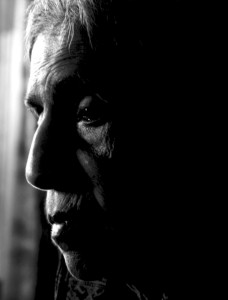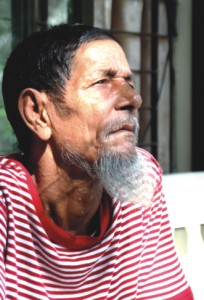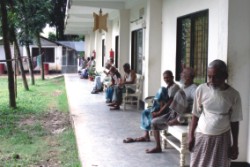| Cover Story
The Value of Respect
Kajalie Shehreen Islam
Photographs: Zahedul I. Khan
Once in an African country, there was the problem of there being too many elephants. Researchers came to the conclusion that 25 percent of the elephants had to be killed off. When it came to deciding which of the mammals would be killed, the older elephants were chosen, for they only ate and did not work and apparently did not have anything to contribute. Three years later, it was found that the number of young elephants in the country had begun to reduce at an alarming rate. Investigation into the matter showed that there had been cyclones in the last three years, after which many elephants had died. Previously, whenever a cyclone was approaching, the older elephants would scream warnings, and baby and young elephants playing by the sea would return to safety. With the older elephants killed off, there was no one to warn the young and, during the cyclones, they remained playing on the coast and were killed.
 White hair, wrinkles, missing teeth. Faltering voice, stumbling steps, walking stick in hand. Dependent, helpless -- this is our usual picture of the elderly. Grandparents, parents, and the elderly around us, along with their years, are often stripped of their dignity and their identities as they used to be -- as professionals, as people contributing to the greater society, even as family members. At a stage in their lives when they need sensitivity, care and attention as much as children do, if not more, they are made to feel worthless, burdens on their loved ones for whom, in their time, they had sacrificed so much. They fade into the background of vibrant homes and families which they themselves created. Sometimes, they are not even this lucky, and are dispossessed of everything they ever had -- their wealth and social status, their homes, and even their families. White hair, wrinkles, missing teeth. Faltering voice, stumbling steps, walking stick in hand. Dependent, helpless -- this is our usual picture of the elderly. Grandparents, parents, and the elderly around us, along with their years, are often stripped of their dignity and their identities as they used to be -- as professionals, as people contributing to the greater society, even as family members. At a stage in their lives when they need sensitivity, care and attention as much as children do, if not more, they are made to feel worthless, burdens on their loved ones for whom, in their time, they had sacrificed so much. They fade into the background of vibrant homes and families which they themselves created. Sometimes, they are not even this lucky, and are dispossessed of everything they ever had -- their wealth and social status, their homes, and even their families.
In general, it is during old age that the body begins to betray the person. The only solution to this, albeit partial, is improved medicare. And, while modern medicine has increased the lifespan, it has yet to make the extended lives more enjoyable. On their own, the aged, or better still, people throughout their lives, can take measures to stay healthy, age naturally and as smoothly as possible. Complete physical examinations and regular check-ups can help prevent illness. In addition, not smoking and watching one's weight have been suggested by doctors as two vital points of preventive health care. Physical activity -- walking, swimming, playing golf, doing yoga, etc. -- contributes greatly to healthy ageing. While walking is the overall best exercise with the lowest risk of injury, strength training, flexibility and balance training also help to maintain bone and muscle mass and prevent aches and pains. Rest and sleep are equally important, while touching -- whether by having intimate relations with a partner, getting massages on a regular basis or simply stroking a loved pet -- is a basic requirement for optimum health. And of course, keeping stress to a minimum is important throughout one's life.
 Loneliness is one of the worst fates the elderly have to face |
The economic problems of the aged arise from their lack of employment and the resulting lack of income. In Bangladesh, the State has taken measures in an attempt to counter this. There is currently Tk. 500 crore allotted for the elderly, which is distributed as a monthly stipend of Tk. 225 per person. Questions have been raised, however, as to the appropriateness and sustainability of the initiative. Also, according to Dr. ASM Atiqur Rahman, Secretary General, Bangladesh Association for the Aged and Institute of Geriatric Medicine (BAAIGM), to ensure a minimum standard of care for the aged, Tk. 1,000 is needed.
“Tk. 500 crore is a lot of money which could be better utilised if put into an industry, the returns of which could be used to benefit the aged,” he says.
With regards to employment, mandatory retirement at age 57 in government service is a gross violation of human rights, says Dr. Rahman. “People should be given an option to see whether they can and want to carry on. The retirement age is also discriminatory with people in different professions retiring at different ages.”
The elderly have a lot to give, says Rahman. “We just have to look around us to see that our most noted personalities, from the media to the whole cabinet of the current caretaker government, are aged.”
According to Rahman, the young generation -- currently 40 percent of our total population -- should be used as a resource for the elderly. “The young must be addressed for the security of older persons through national development. They can act as a support system, their income a resource. The State alone can't do everything.”
Psychosocial problems are possibly the most complicated factors that come in the way of healthy ageing for they are within the individuals themselves, caused largely by those around them. Their employment lost, assets divided, their power in the family reduced, treated differently by society, frequently referred to as “old and infirm”, elderly people often feel valueless.
 Dr. ASM Atiqur Rahman, Secretary General, BAAIGM |
The elderly should be included in social activities, says Dr. Atiqur Rahman. “They can be involved in rural development, the health sector, non-formal education, agricultural development and a host of other things. The local government can make this happen by involving older persons at the Union level.”
In some countries, he says, there is an Older Person's Association (OPA), where the elderly get together. In Vietnam and Cambodia, it is a Buddhist monastery, more like a community centre, where older people get together, talk, share their feelings, have fun, even generate some sort of income for themselves. Dr. Rahman suggests the establishment of similar older person's clubs in every neighbourhood in our country, where the aged can get together.
“In Singapore, there is even a place for old single people to meet!” says Rahman.
Homes for the elderly are one way of countering the loneliness and vulnerability of older persons.
“The justification for old age homes,” says Dr. Atiqur Rahman, also a professor at the Institute of Social Welfare and Research at the University of Dhaka, “is that they enable the aged to live secure, independent lives.”
There can be two types of homes, he says. One is for the destitute. Here, the people will live in the homes and be involved in the community. They will do their own work as well as be included in the local administration. For example, they can be involved in educating the poor children in their area.
“The other type of home,” says Rahman, “is for those who do not have enough children to look after them, or whose children live abroad or who have only daughters. These people live in homes because they prefer and can afford to do so.”
The elderly are often abused in their own homes, says Rahman. They have no social security, and the law does not provide them with any either. In the past, when people used to have many children, their future was more secure, even though the government did not provide it. Today, the State still does not ensure this security, and, in addition, fewer or no children have left people even more alone and vulnerable.
“Living in old age homes gives rise to what we call new family relationships,” says Rahman. “By living at a distance from each other, parents and children get along better than if they were living together.”
The Probin Hitoishi Kendra in Agargaon is one such home where residents pay a fee for a single, double or four-bed room and three meals a day.
Mira Chowdhury spends her time at the home reading books and newspapers, doing embroidery work and taking walks.
Octogenarian Liaqatunnisa does not remember for how long she has been at the home. “It's all right,” she says. “It's what you make of it. You have to adjust, which I have. When I feel lonely I walk around the building.”
Seventy-one-year-old Irfan Haider, a former employee at the Bangladesh Krishi Gobeshona Institute in Joydebpur, has been living at the home for five years. “After my wife died, there was no one to hold the family together,” he says. So, when Haider, who had been living with his son for a short while after retiring, saw an advertisement for the home in the newspaper, he moved. Now he spends his days watching television and taking walks outside the home.
Other facilities at the home include free medical care at the neighbouring Geriatric Hospital, a library and other recreational facilities. There are also monthly “addas” for the aged both in and outside the home.
The key is to include the aged in social activities. “When we neglect, ignore and exclude the elderly,” says Dr. Rahman, “we are, in fact, excluding ourselves. Because old age is the one universal problem of the world, which will be faced by everyone, irrespective of nationality, class, race, faith, etc.”

Mira Chowdhury spends her time at the home doing embroidery work |

Sharing a meal with fellow boarders |

A mother and son visit the residents of Probin Hitoishi Kendra |

Days at the old home are spent relaxing |
Unfortunately, however, the elderly are excluded on almost every front, most importantly, in the education system and the media, both of which are important in creating knowledge and awareness of the elderly and their needs. While the aged are totally absent in school texts, the media, too, which has a separate beat for everything else -- children, women, sports, fashion, etc. -- hardly ever focuses on older persons. “Ageing is a lifelong preparation,” says Dr. Rahman, “and the media can prepare people for old age and the lifestyle they will have then. It can also create inter-generational linkage, which is very necessary.”
Religion is also an important factor. “Religious misinterpretation does two things,” says Dr. Rahman. “It encourages beggary, by which older persons get preference in alms-giving behaviour. This is charity-based but in fact, it should be rights-based. The elderly have a right to certain extra facilities because of their extra needs, but they should not be encouraged to be dependent and living off of begging.” Religion also contributes to the exclusion of the elderly. “With age, people are more drawn to religion and it often segregates them, prevents them from socialising and enjoying their lives. Thus religious leaders also have a role to play in making people aware.”
According to Dr. Rahman, our indigenous support system, that is, the ministries of local government, social welfare, health and religious affairs need to make a combined effort for the elderly, countering local problems locally. The law can also be formed so as to help the aged. In India, for example, a law has been passed by which parents can sue children who can afford to but do not take care of them.

Just arrived: 85-year-old Khadeja Begum at the Boyoshko o Shishu Punorbashon Kendra in Gazipur
“Mass poverty has shattered the concept of joint families,” says Dr. Rahman, “but families can help each other by living close together, renting flats in the same building or homes in the same neighbourhood, so that they can be there for each other in times of need.”
Currently, seven percent of the population of Bangladesh and 14 percent globally are aged over 60. By 2050, there will be more elderly people than there will be young. Ageing is a stage in life that will be faced by all. Instead of focusing on the drawbacks of old age, we should give the elderly their due by focusing on their positive contributions through knowledge, experience and patience. By being empathetic to the needs of the aged and including them in our lives, we can help them to pass their years in peace, comfort and with dignity, while preparing ourselves for the inevitable future that awaits us all.
A Promise Fulfilled
 Khatib Abdul Zahid Mukul |
When he was 12 years old, Khatib Abdul Zahid Mukul saw a helpless old man being thrown out of the house by his son. “The man was saying, 'I'll leave all my land to you, you don't have to feed me, I'll sleep outside the house, please, just let me be with my grandson' but to no avail. That very day,” says Mukul, “I promised God that if he ever gave me the means, I would help the elderly people of Bangladesh.”
In 1987, Mukul's dream came true with the establishment of the Boyoshko o Shishu Punorbashon Kendra, first in Uttara, and since 1994, on 72 bighas of land in Gazipur. Mukul, Chairman and Managing Director of Givensee Group of Industries, runs the home by himself, without any local or foreign funding, from income generated from waste cloth in his textile industries.
There are currently 180 residents at the home and facilities include 24-hour medical care, recreational facilities and also a burial ground for those who have no kin.
Chand Mia, whose children cannot afford to look after him, saw an ad for the home on television and came here seven years ago. He spends his days praying, walking on the grounds and talking to others in the home. “We have everything here,” he says. “Food, clothing, everything. Where else can I go? I have nowhere else to go.”
Shamsunnahar, from Gopalganj, was brought to the home by her niece's husband, on the pretext of taking her to his own house. Hasina Begum has been here for three months. Angry with her daughters for not protesting when her niece threw her out of the house and for not coming to see her when she underwent surgery, she left without telling anyone where she was going. She cries for her daughters but prefers to live in the home. Feroza Begum, who used to work as a domestic help after her husband left her, does not remember how long she has been here.
“Each person has a story,” says Mukul. He relates tales of heartbroken parents who requested to be buried before their children were informed of their death. Of children searching for their parents and finding them in the home but all too late. Of children who did not come to see their mother when she was undergoing surgery for breast cancer. And of parents selling their last possessions to go visit their children who abandoned them in their old age.

Hasina Begum (L) cries over photographs of her children. Feroza Begum cannot remember how long she has been at the home.
“It is not that social bonds have weakened,” says Mukul. Just the other day, a girl left her father at the home because she cannot look after him. She pays for her own education by tutoring other children. “She was in tears,” says Mukul, “but she didn't have a choice. Poverty is the main reason that children let their parents go.”
About three years ago, Mukul established a home in Rangamati for elderly Adivasis. Last year, he started one in Goalanda in Rajbari for elderly sex workers. “A few years ago, I saw on television that a sex worker in Goalanda had died and the religious leaders there were refusing to let her be buried. I went there and arranged for her burial and made a place where others could be buried in future. Later, I established the home.”
Mukul's next plan is to establish 10 old age homes in Dhaka, providing legal services for parents whose children can afford to care of them but do not, medical care and recreational facilities for those who live with their children but do not get these, and residency for those who do not have anywhere else to go. Provided he can find a suitable building, Mukul wants to start this project by the coming Eid, beginning with the Dhaka 4 (Rampura) area.

Back in Gazipur, 85-year-old Khadeja Begum has just arrived at the home today. After living with her daughter for 30 years, she feels like a burden, taking up a separate room in the house, etc. The supervisor of the women's section of the home tells her that she is coming from one daughter's house to another, that she will have everything that she needs here.
Khadeja Begum, in tears, says, “I just want people around me, someone to talk to, to be with me…”
Copyright
(R) thedailystar.net 2007 |
